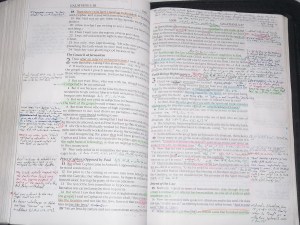Sometimes, it takes a bit of a challenge to draw me out of my current shell. For those of you who aren’t up on my personal life, I’ve got another Bugg in the oven (a girl this time) and between getting ready for her arrival and three out of four of my computers being down, I simply haven’t had the time to blog that I’d like. I have been working on the Curse of the Law series, but ended up wanting to write it all out from start to finish before posting any more.
 But today, Peter Goodgame of Red Moon Rising has succeeded in drawing me out with an article entitled, “Does Paul teach that followers of Christ remain under the authority of the Law of Moses?” Since Peter has been nice enough for forward me a copy of his very excellent book, The Second Coming of the Antichrist as well as Red Moon Rising to review (for the record, Antichrist is far and away the better of the two, but both are well worth reading), and since I had the chance to interview him on the Iron Show this caught my attention.
But today, Peter Goodgame of Red Moon Rising has succeeded in drawing me out with an article entitled, “Does Paul teach that followers of Christ remain under the authority of the Law of Moses?” Since Peter has been nice enough for forward me a copy of his very excellent book, The Second Coming of the Antichrist as well as Red Moon Rising to review (for the record, Antichrist is far and away the better of the two, but both are well worth reading), and since I had the chance to interview him on the Iron Show this caught my attention.
I tend to pick on the people I like and respect the most, and Pete certainly fits the bill. He’s humble, a real disciple of Christ, and both well-read and articulate. That’s not to say that I agree with him on a lot–but I love the challenges he raises in his work. And that being the case, I thought it right that I rise to the challenge and answer his charge, quoted here from the conclusion of what promises to be a multi-part series:
It is absolutely impossible to reconcile the teachings of Paul with a theology that embraces the Mosaic Law and the Old Covenant practices of Sabbath-keeping, kosher diet, observance of feasts, and circumcision as binding upon New Covenant believers. You cannot hold to the teachings of Moses and to the teachings of Paul at the same time. You must choose one or the other. Either embrace Moses and reject Paul as a false apostle, or embrace the teachings of Paul and accept that in Christ the Old Covenant with its commandments and ordinances has passed away.

I’m sorry Peter, I love you, and I regard you as a brother in Yeshua, but you’re 100% wrong on this. I also have to ask why, since you have my email, you decided to post this without asking why I would disagree–as you would’ve known I would. But since you’ve decided to post publicly first, I’m going to answer in public as well–not to rebuke, but to stir discussion.
First, a general observation about this first article: Other than the initial quote from Matthew 5:17, it doesn’t quote from Yeshua at all. That, it would appear, remains for part 2. To me, it would seem that we should first address what the Messiah said before even getting to what His Emissary said. To make the Son of God secondary to Paul is . . . a bit backwards, if an unfortunately tendency among Christians in general.
So to get to the quote-and-rebuttal format that I prefer:
Did Jesus really teach that New Covenant Christians must continue to follow the Law of Moses? The answer that came from the Gentile Church from the very beginning was a flat “No.”

There’s a big problem with the above quote, and it is the word “Gentile.” Was the Jerusalem Council of Acts 15 Jewish or Gentile? The word in front of the word “Council” should answer that question. I’m not sure if this is a typo or if Peter is making a point that I’m not catching.
But moreover, Peter shows that he doesn’t understand the original issue and is filtering the question through his 21st Century Protestant Christian lenses. The question should instead be, “Did Jesus really teach that Gentile Christians must continue to keep all of the ceremonial commandments of the Torah?” to which we would respond, “The answer that came from the Jewish Assembly from the very beginning is, ‘not entirely.”
See, neither the Acts 15 council nor Paul’s letters on the subject ever really bring up the question of whether Jewish disciples should continue to keep the whole Torah (though Paul does touch on the subject, and as we will see, is very clear that Jews are indeed obligated). Their question was entirely focused on how to best integrate the Gentile believers into what had been for its first decade an almost entirely Jewish institution.
By what authority and from whose teaching did they come to this conclusion? The answer to this question is the Apostle Paul.
Where in the world would Paul get an authority to abolish the Torah that the Twelve who actually walked with Yeshua in the flesh for 2-3 years didn’t? I mean really, do Christians not think through the logic of making Paul the supreme Apostle? I’m not just trying to pick on Peter here–again, I really like and respect the guy–but this just goes to show the virtual worship of Paul that Messianics reject.
Among the Gentile churches in the first century Paul was looked up to as an authoritative representative of the risen Jesus Christ.
“Gentile” being the key word, and “an” being the other key word. But even Paul submitted his views to the authority of the Jerusalem Council, and states plainly that Peter, for example, still had a mission to the circumcised (Gal. 2:8). Ergo, if Peter’s reading of Paul were correct, it might be appropriate to say that Paul did not regard the Torah as binding on Gentile Christians–but one could not then take that statement and turn it into an attack on Messianic Jews for following the example of the actual King of the Jews in keeping that Torah, as Peter does.
We show that the Law of Moses is indeed still binding on Jewish disciples and that Paul himself kept the Torah in The Jew and the Law, so I won’t repeat all of those points here. I’ve also covered the horrifyingly anti-Semitic results of Christianity’s use of Paul’s work in defense of the Gentiles as an attack on Jewish Torah-keeping in my Judenrein Christianity series, so again I won’t repeat what has gone before.
Paul was the first to specifically target the Gentiles for conversion . . .
I’m pretty sure that honor was actually given to Peter in Acts 11.
For evangelicals the New Covenant is understood as the replacement of the Old Covenant, even though much of the ethics and many of the commandments of the Old can be found within the New. On the other hand Messianic believers tend to believe that the New Covenant includes the Old Covenant, with its Sabbath-keeping, dietary restrictions, Feast Days, etc., which remains in force for believers but is applied differently to Jews and Gentiles.
Actually, that’s not what Messianics teach at all, as I or any other Messianic would have told Peter had he simply asked. Rather, we make the distinction between the Old Covenant and the commandments of the Torah. Paul himself makes the distinction between “law” in the sense of the covenant, and “the Law” in the sense of the Torah’s commandments, as I show here. Failure to recognize this distinction (or even make it transparent in the standard Christian translations) has led to a gross misunderstanding of Paul’s writings, as has been noted by Christian authors like N.T. Wright, E.P. Sanders, and James Dunn.
But again, let us simply look at Paul’s life to see how he lived out the New Covenant on a practical day-to-day basis: He went to synagogue on Shabbat (Acts 13:14, 17:1-2, etc.) and when he could find no synagogue building, sought out other Jews to pray (16:13). He took a Nazrite vow on his journey long before he knew of a problem in Jerusalem (18:18). He hurried back to Jerusalem to take part in the Shavuot (Pentecost) pilgrimage feast (20:16). He returned with the intent purpose of not only giving alms to the poor, but also to make phosphoras, sacrificial offerings in the Temple (24:17)–undoubtedly including the ones required to fulfill his Nazrite vow (Num. 6:14-17). He was willing to buy sacrifices in bulk to help four other guys complete their own Nazrite vows in order to demonstrate that he was not “teaching all the Jews who are among the Gentiles to forsake Moses, telling them not to circumcise their children or walk according to the customs” (Acts 21:20-26). He insisted under oath to the Sanhedrin that he was still a Pharisee (23:6) and to Festus that he had done nothing either against the Law of the Jews or the temple (25:8).
Paul’s entire post-conversion life is utterly incompatible with a man who believed that the Torah had been abolished by the coming of Christ or that keeping the Torah’s commands were incompatible with being under the New Covenant instead of the Old.
Peter goes on to make an appeal to the work of Brian S. Rosner, author of Paul and the Law. I’ve not read Rosner’s work, so I can only comment on what Peter has shared. However, what Peter presents is clearly flawed:
The first move, of repudiation, can be seen in the negation of circumcision in 1 Corinthians 7:19a. Another instance is in 1 Corinthians 9:20, where Paul says simply, ‘I myself am not under the law’.
1 Corinthians 7:19 says, “Circumcision (being Jewish) is nothing and uncircumcision (being Gentile) is nothing, but the keeping of the commandments of God.” Many Bible verses add, “is what matters” to the sentence, but in the process miss the point. Paul goes on to say in v. 20, “Let each man remain in that condition in which he was called,” which is reiterating his statement in v. 18. So if Paul is calling on Jews, who were called when circumcised, to remain circumcised, how does this constitute a repudiation of circumcision? Rather, what Paul is saying is, “Whether one becomes circumcised or not should be nothing more to the person than keeping God’s commandment. Those who are already circumcised, the Jews, should continue to be so. Those called uncircumcised are commanded not to become Jews by circumcision.”

None of this is anything close to repudiating the commandment of circumcision. Indeed, we see that Paul thought that those circumcised should continue to circumcise their sons (Acts 21:21-26 again), and he himself circumcised Timothy, the son of a Jewess (16:3).
Moving on to 1 Corinthians 9;20, Paul does not actually say, “I am not under the law” except in the Alexandrian version of the text. All of the other textual traditions leave that line out. One should never base one’s theology on a disputed passage.
Moreover, as we covered previously under Common Mistranslations, Paul does not here say “under the law,” but rather “under law.” Paul defines “under law” in Galatians 4:21-31 to mean “under the Sinaic covenant”–yet as we have seen, saw no problem with keeping the whole Torah under the New Covenant.
Next, it’s ludicrous for Paul, a Pharisaic Jew, to have “became as a Jew” in the sense that a Gentile Christian might–that is, to adopt something apart from who he really is. Nor can we claim, as Paul’s critics and some of his supposed followers might, that this means that Paul had abandoned all Jewish practice except when pretext and hypocrisy (lit. “acting”) was expedient to him. The man was simply too much of an honest zealot to merit such a slander on his character!
Finally, the phrase “without law” is mistranslated. The Greek anomia means “lawless” and has the connotation of “wicked” or “rebel” everywhere else it appears in the NT. Does this mean that in order to reach pagans, Paul slept around with cultic prostitutes? Of course not.
So then, how should we understand him? Let’s pull all of the above together: “To the Jews I became [in my way of presenting the Gospel and ministering to them] as a Jew; to those who are under [the Sinaic covenant of] law as one under [the covenant of] law, so that I might win those who are under [the covenant of] law. And to those who are lawless [and wicked], [I ministered in a way that could be understood to those] as lawless, thought not being [myself] lawless to God, but en-lawed of Messiah[, ministering to those outside of God’s grace as Messiah Himself did], so that I might win those who are lawless [and wicked].”
Note that Paul is careful to say that he is not lawless himself, but is en-lawed, or within the Torah as taught by the Messiah. If that is the case, and Yeshua Himself cited the importance of circumcision, putting it even above the Sabbath (John 7:22-23) which Yeshua taught was given as a gift to man (Mark 2:27), then Paul could not have taught that the Torah, or circumcision, was abolished.
Besides all this, Paul himself said, “Then what advantage has the Jew? Or what is the benefit of circumcision? Great in every respect. First of all, that they were entrusted with the oracles of God” (Rom. 3:1-2). A very strange thing indeed if Paul was renouncing all circumcision.
The second, replacement, is evident in 7:19b with the call to keep God’s commandments, that is, apostolic instructions. Elsewhere in 1 Corinthians replacement of the Law of Moses can be seen clearly in 9:21, where Paul says, ‘but am under Christ’s law’.
And what is Christ’s law? The Torah (Mat. 5:17-19).
Rosner goes on to argue that Paul’s only use of the Torah was to re-appropriate it as prophecy. While it is true that Paul found the Torah teeming with prophetic import (and no rabbi would disagree with him), this does not mean that Paul, who kept the Torah himself, saw that as its only purpose, and Rosner (as presented by Goodgame) fails to substantiate his point. I myself have written on the prophetic meaning of the Feasts of Israel, both past and future. Yet it was only by actually living out the Feasts that I gained the insight that I have, and it is through the Feasts that I pass on that insight to my children. Moreover, the fact that many of the Feasts still have a future fulfillment would mitigate against the idea that they should no longer be kept now that they are “fulfilled.” Why not celebrate the ‘fulfilled’ Feasts in honor of Messiah and the ones yet future in anticipation of His return?
Paul’s stated desire to win Jews for Christ by pretending to be an observant Jew . . .
Waitaminute. Did Rosner, and by extension Peter, just say that Paul is an untrustworthy hypocrite?
 We Messianics have far too much respect for Paul for that.
We Messianics have far too much respect for Paul for that.
The verb ‘to abolish,’ katargeo, is in fact a favorite word for Paul to describe what Christ does to the law. Its strength in this context [within Ephesians 2:14-18] can hardly be missed, as it sits in company with ‘tearing down’ and ‘putting to death’.
Back up there. Where exactly do we get the idea that Ephesians 2:14-18 is referring to the Torah? The reference to “the dividing wall” is to the barrier that separated the Court of the Gentiles from the Court of the Israelites in the Second Temple. Archaologists have recovered a plaque from it which reads, “No stranger is to enter within the partition wall and enclosure around the sanctuary. Whoever is caught will be responsible to himself for his death, which will ensue.”
Test time: Tell me where in the Torah, the Prophets, or the Writings (the OT) there is a command to build a wall around the Temple to keep Gentile worshipers from getting too close? Go on, look for it. We’ll wait.
Give up? You won’t find such a command in God’s word because there isn’t one. In fact, the dividing wall was erected in direct violation of Numbers 15:14-16, which makes it clear that the alien (Heb. ger) who wished to sacrifice to the God of Israel in His sanctuary must be allowed to do so in exactly the manner of the native-born Israelite.
So then, when we understand the allusion and the context, we see that when Paul writes of “the Law of commandments contained in ordinances,” he is not speaking simply of the Torah, but rather of a flawed interpretation (dogmasin, dogmas, ordinances) of the Torah that actually goes against its real intent. I cover part of the nature and reason behind these ordinances in my series on the Eighteen Measures.
In 2 Corinthians 3:7 Paul uses it in the passive voice to say that the Law of Moses has been ‘set aside’, with its ‘ministry of death, chiselled in letters on stone tablets’.
In the covenant sense, sure. But in speaking of “tablets of human hearts” Paul refers to Jeremiah 31:31-34, where the prophet speaks of the day when the Lord “will put My Torah within them and on their hearts I will write it.” How can the Torah be abolished if the promise of the New Covenant is to have it written on our hearts. Moreover, Paul makes the point in Romans 7:7-13 that it is not that the Torah became death (or a minister of death), but rather that our sin nature rebels against any commandment given by God, so that the written Torah creates an impulse to rebel. God’s solution was not to remove any law from us, but rather to write His eternal Law–the Torah–on our hearts.
F. F. Bruce writes that what has been done away with in Christ is not the law ‘as a revelation of the character and will of God’ but the law ‘as a written code, threatening death instead of imparting life’…
 And yet, Christians are still to be exhorted from a written Bible of written commandments, even under the New Covenant. So even there, the issue is not whether we have a written code, but whether it has been written on our hearts as well as on paper and which commandments it is comprised of . . . and which commandments are required of which groups of people.
And yet, Christians are still to be exhorted from a written Bible of written commandments, even under the New Covenant. So even there, the issue is not whether we have a written code, but whether it has been written on our hearts as well as on paper and which commandments it is comprised of . . . and which commandments are required of which groups of people.
The view that the law as law-covenant is that which Paul sets aside complements Paul’s negative take on the law as commandments and represents the most comprehensive (and least ambiguous) way of expressing the capacity in which the law has been abolished by Christ. (pp. 77-78)
Quoth Paul:
- For not the hearers of the Torah are just before God, but the doers of the Torah shall be justified. (Rom. 2:13)
- Therefore, if an uncircumcised man keeps the righteous requirements of the Torah, will not his uncircumcision be counted as circumcision? And will not the physically uncircumcised, if he fulfills the Torah, judge you who, even with your written code and circumcision, are a transgressor of the Torah? (Rom. 2:26-27)
- Do we then make void the Torah through faith? Certainly not! On the contrary, we establish (i.e., uphold) the Torah. (Rom. 3:1)
- Therefore the Torah is holy, and the commandment holy and just and good. (Rom. 7:12)
- For we know that the Torah is spiritual, but I am carnal, sold under sin. (Ro 7:14)
- For I delight in the Torah of God according to the inward man. (Rom. 7:22)
- For Christ is the end (telos, goal) of the Torah for righteousness to everyone who believes. (Rom. 10:4)
- And I testify again to every man who is circumcised that he is a debtor to do all the Torah. (Gal. 5:4)
- But we know that the Torah is good if one uses it lawfully . . . (1 Ti. 1:8)
- All Scripture [including the Torah] is given by inspiration of God, and is profitable for doctrine, for reproof, for correction, for instruction in righteousness, that the man of God may be complete, thoroughly equipped for every good work (2 Ti. 3:16-17)
That doesn’t look very abolished to me. Back to Peter:
In Paul’s theology it is faith in Christ that saves, which leads one to naturally obey “God’s commandments” (1 Cor. 7:19). These New Covenant “commandments” are simply the teachings of Christ as handed down to the Apostles (Matt. 28:20), which are equally binding upon Jews and Gentiles. . . There are many serious Bible scholars within the Messianic and Hebrew Roots movements who are teaching that Jesus Himself upheld the keeping of the Old Covenant law, and therefore if we want to truly obey the “commandments of God” we must keep the Sabbath, eat kosher, observe the feasts, and some are even saying that if we are serious about obeying God, all males must inevitably submit to circumcision!
Not exactly, and I would disagree with the Hebrew Roots Christians who take that stance (few of whom have any real connection to the wider Jewish community). So would most of the major Messianic associations. As shown above, the Gentile disciples were not required to keep certain commandments in the Torah–but then, that was always the case, not just under the New Covenant. For example, Noah was told that he could eat any moving thing (Gen. 9:3) and the ger (alien) in the Land was permitted to eat meat that an Israelite could not (Deu. 14:21). From this, we can infer that kashrut was never required of Gentiles; it was a cultural commandment given only to the Jews. Circumcision would be another. One could argue whether the Sabbath and the Feasts also qualify. In all these cases, we see that the Jewish disciples of Yeshua continued to keep these ritual aspects of the Torah, up to and including making sacrifices in the Temple.
That’s not to say that Gentiles were not allowed to keep Passover, for example (cf. 1Co. 5:7)–in fact, Paul made the point that those who did were not to be judged any more than those who did not (Rom. 14:5-6), a commandment that Peter is in violation of by virtue of his article. However, I have no problem with Christians who say, “I don’t think I should keep Passover because . . .” Fine. You are invited, but not compelled–but don’t dare try to pass judgment against me.
Why is this so important to me? Because as I documented in my aforementioned “Judenrein Christianity,” for too long Christians have preached a false gospel every bit as damnable as that of Judaizing. They have told Jews that they can be saved, but only if they give up everything that makes us Jewish. This is entirely against the teaching of Paul, who said that the circumcised were to remain circumcised, and that the circumcised were debtors to keep the whole Torah.
Until Christians repudiate this false gospel of gentilization to the Jews, they are acting in hatred of the Jewish people. I know that they don’t intend this–Peter certainly strikes me as the kind of guy who is incapable of hating anybody–but that’s the end effect of their message: “Hey, you can be saved . . . but only if you stop being Jewish!”
I hope that Peter gets a chance to read this and think it over. If nothing else, it should make for an interesting discussion.
Shalom.

Interesting article. Love this quote from Wesley:
Acts 21:24
And all will know – that thou thyself walkest orderly, keeping the law – Ought he not, without any reverence to man, where the truth of God was so deeply concerned, to have answered plainly, I do not keep the Mosaic law; neither need any of you. Yea, Peter doth not keep the law. And God himself expressly commanded him not to keep it; ordering him to go in to men uncircumcised, and to eat with them, Act_11:3, which the law utterly forbids.
LikeLike
I love John Wesley and his work, and wish the later Methodists had kept to his example, but he’s flat-out wrong on this. Cite for me chapter and verse where the Torah forbids eating with Gentiles.
LikeLike
yeah, I was hoping you could fill me in on that.
BTW, while were on the subject, what law do you think Paul was referring to in:
1Co 14:34 Let your women keep silence in the churches: for it is not permitted unto them to speak; but they are commanded to be under obedience, as also saith the law.
LikeLike
Let me respond to a question with a question: Where in the Torah, chapter and verse, does it command women to be silent in the synagogues?
LikeLike
You are answering my question with my question with *my* question???
Leaving alone the red herring of ‘synagogue’, my initial guess is that it is referring to the creation ordinance, and speaking of the obedience, not the silence.
LikeLike
There is no such command in the Torah. So we have a choice: Either Paul was referring to Jewish law apart from the written Torah and imposing that on the churches (unlikely), or he is quoting a position and then refuting it in the very next verse: “Did the Word of God come to you (men) alone?” Given the prominence of women in the early Ekklessia and the fact that Paul had just given rulings on how prophetesses (who by the nature of their gift would be required to speak out) should conduct themselves, the clear answer is, “No.” Therefore, women may speak in the assemblies/churches.
LikeLike
What??!?
So much wrong with that it is hard to know where to start, but let’s begin with the law. As I say the obvious interpretation, given by the reformers, is that ‘the law’ referred to is not a law enjoining silence, but the law requiring obedience/subjection, a common principle in the NT, especially in Paul but also in Peter.
LikeLike
I agree that a woman should be in obedience to her husband (and that’s covered elsewhere), but that’s not the point of 1Co. 14. If you don’t like my take on it, you could read the articles that I got that from: http://christianthinktank.com/fem09.html and http://www.tektonics.org/lp/ohshutup.html.
LikeLike
Maybe I will read them, when I have a break from the articles I am writing. You do realize, at least, that that is a new doctrine in opposition to what the church pretty consistently taught for 1900 years?
LikeLike
And, of course, this is a parallel passage with I Tim 2, which very much lays out the same argument without any ‘What?!” s
LikeLike
I think we have a translation convention issue in 1Ti. 2. In both Greek and Hebrew, “husband” and “wife” are simply “man” and “woman,” respectively, with only the context to tell you if they are married. Just a few verses down from the infamous, “I do not allow a woman to have authority over or teach a man,” line, those words are translated “wife” and “husband.” Therefore, I think the better translation would be, “I do not allow a wife to usurp authority (alt. “work independently”) from or teach a husband.”
LikeLike
I think this subject requires a full post. I did look at one of the posts you linked me to and, quite frankly, it was horrible. If I do have time to do a full post we can comment more intelligently there rather than ad hoc and off-topic here.
LikeLike
Not a bad Idea. I’ve thought about tackling those for a while now, but was busy with other projects. Maybe I’ll get a chance to work on this over the Thanksgiving weekend.
Happy Thanks-Hanukkah-giving, btw. :)
LikeLike
You still owe me a post, actually. Been promising it for a long time. I forget what it is, actually, but I’m sure you can find it :)
LikeLike
Do I? I’ll go archive-binging and see if I can find it. If you remember anything at all on the topic, that will help narrow it down.
LikeLike
I think it might have been Acts 21, but you own me one on the elder brother of the prodigal son, too :)
LikeLike